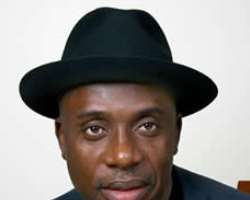HOW AMAECHI TURNED P'HARCOURT TO GARDEN OF LITERATURE, BY KOKO KALANGO

•Amaechi
Five years ago, Port Harcourt was more in the news for inter-cult violence and kidnapping than for anything else. Residents lived in fear daily and went to bed with one eye open. In recent years, however, that worrisome state of affairs has given way to a more stable environment.
The current state government, headed by the Rt. Hon. Rotimi Amaechi, has calmed virtually all nerves and is gradually restoring the city to its former glory as the Garden City and a place of peaceful living.
While an array of developmental work is going on across the state's 23 local government areas, the state government is also systematically positioning Port Harcourt as NigeriaÃs next literary capital. Since 2008, and with the backing of the state government, the Rainbow Book Club, founded by Koko Kalango, has hosted the multi-dimensional Garden City Literary Festival (GCLF) with participation drawn from celebrated literary figures locally and globally.
At the festival opening ceremony in 2010, Governor Amaechi spoke about his abiding interest in literature and how Chinua AchebeÃs A Man of the People is one of his all-time favourites, because it instructs him as a politician. 'The truth is that we have very good writers in Nigeria but they haven't achieved the same stature as, say, Chinua Achebe,' he said, tasking writers to continue to address the corruption in Nigeria. 'Politicians will not change until you the writers become the voice of the people.
'Along the way, he announced plans by his administration to build a world-class library in the state capital. ìThe building plans are in my office, they have already been approved and the library project itself would cost about N1.2 billion,' he said, adding that a large chunk of the would will be borne by corporate organisations and other sponsors. Amaechi, who is a graduate of Literature, also shared his vision of a literary festival that will not only be sustained beyond his own time in office but one that will be positioned to attract increased corporate support strictly on the strength of its own values.
Now in its fourth year, the GCLF is proving to be the literary festival to beat in Nigeria be it in organisation, content and the pedigree of its attendees. Our dream is that in the near future, the city of Port Harcourt would not only be known for its oil and gas industry but also as Africa's leading literary hub,' says Kalango, whose Rainbow Book Club organises monthly book readings in Port Harcourt and the 'Get Nigeria Reading Again' initiative, now in its seventh year, in different cities in Nigeria.
'And under Governor Amaechi, Port Harcourt has become the Garden where Literature blooms.'
At its inaugural outing, for instance, the GCLF pulled such accomplished writers as Wole Soyinka, Kofi Awoonor, Elechi Amadi and Gabriel Okara. In 2009, it hosted authors Ngugi wa ThiongÃo and J.P. Clark, among others; and last year, the festival had in attendance the likes of HRM Chukwuemeka Ike and Vice President Namadi Sambo as guests.
'With the first African and black Nobel Prize, the most widely read novel in Africa, numerous literary awards in the international scene, and the most vibrant and populous literary guild in Africa, NigeriaÃs literature has given a robust account of itself, since the nations independence,' said Professor Olu Obafemi, keynote speaker at the 2010 edition on the theme: ì50 Years of Post-Colonial Literatureî.
This year the festival holds between 14-17 September with the timely theme: 'Literature and Politics'. It will be preceded by a book fair, which begins on September 12. Professor Chinua Achebe is billed to deliver the keynote speech, while guest speakers include Amaa Atta Aidoo and Rev. Jesse Jackson.
'The relationship between governments and writers, in the Niger Delta context for example, can sometimes be fragile, especially where writers highlight the perceived flaws of governments, 'The organisers say. 'From the point of view of the people, literature can serve as a mirror to our society; reflecting the good, bad and ugly aspects of our cultures and socio-economic practices.
It is this potential for writers to bring people-oriented issues to the front burner of public discuss, and thereby bring about the much sought change, that African-American civil rights activist Rev. Jesse Jackson will dwell on as guest speaker. Discussions at the festival will fall under four broad categories: ëThe Niger Delta in Literatureà ëThe Voice of Women in LiteratureÃ; ëLiterature and DemocracyÃ; and ëLiterature on War in AfricaÃ.
'GCLF's aim is to create a dynamic forum that inspires debate and change in our society, encourages aspiring writers to maximise their talents and also underlines the importance of books and reading to the development of our society,' the organisers say.
